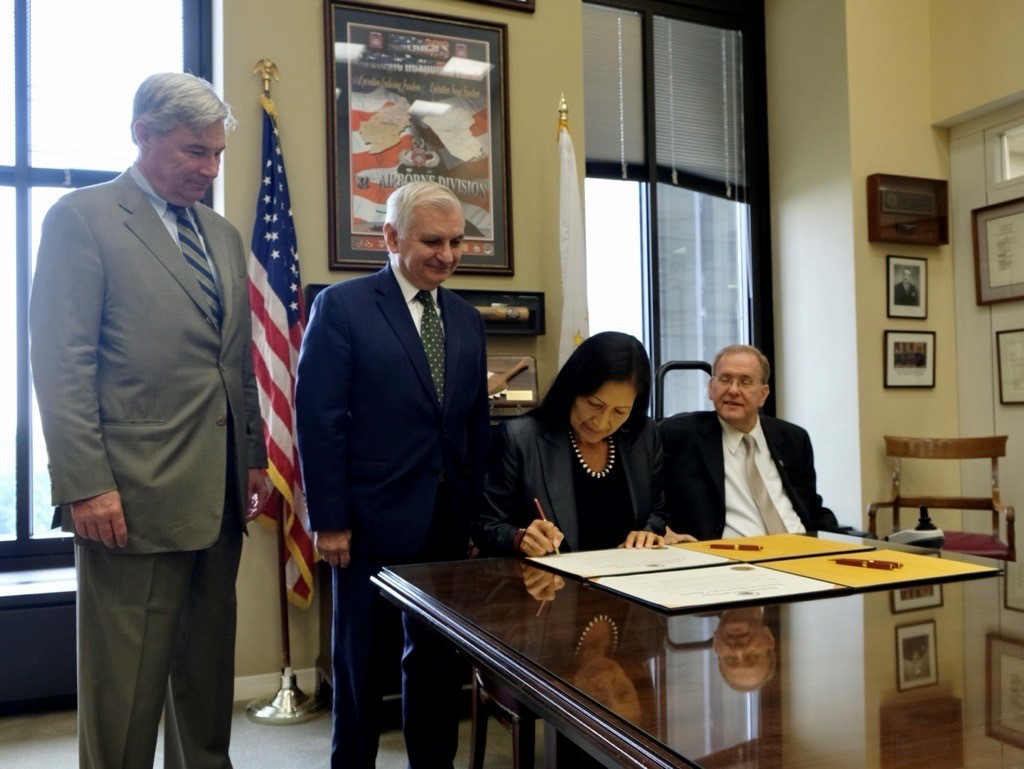News Release

|
Subscribe
|
Secretary Haaland Signs Boundary Establishment for Blackstone River Valley National Historical Park
Boundary designation includes Slater Mill, the birthplace of the American Industrial Revolution
WASHINGTON — Secretary of the Interior Deb Haaland today established the boundaries of Blackstone River Valley National Historical Park, celebrating a significant milestone in the ongoing evolution of a national park that tells the story of the birth of America’s industrialization and its profound impact on society. Secretary Haaland made the announcement in a meeting with members of the Rhode Island congressional delegation today.
Today’s milestone reflects the principles laid out in President Biden’s America the Beautiful initiative, a 10-year, locally-led campaign to conserve and restore the lands and waters across the country. The new park boundaries will help strengthen the local economy, increase access to outdoor recreation, and honor the rich history of the region.
“America’s national parks and public lands reflect the rich history we share across generations and geographies. The new boundaries of the Blackstone River Valley National Historical Park will increase opportunities for visitors and nearby communities to connect with the historical, natural and recreational resources and legacy of the area,” said Secretary Haaland.
“I am thrilled to have reached this important milestone through the multi-year efforts of numerous park partners in both Rhode Island and Massachusetts,” said Blackstone River Valley National Historical Park Superintendent Eric Breitkreutz. “We look forward to expanding public programs and water recreation along the Blackstone River tributary and Blackstone Canal.”
Blackstone River Valley National Historical Park was established in 2014 to help preserve, protect and interpret America’s industrial heritage. The Blackstone River Valley of Massachusetts and Rhode Island is considered the birthplace of the American Industrial Revolution when America transformed farm to factory. The success of the first large-scale cotton spinning mill – Slater Mill in Pawtucket, R.I. – touched off a chain reaction that changed how people worked and lived that continues to reverberate across the nation to this day.
Since the park’s establishment, the National Park Service (NPS) has partnered with multiple state and local organizations throughout the Blackstone River Valley, including the John H. Chafee Blackstone River Valley National Heritage Corridor. The partnership has helped establish municipal historic districts, create and offer interpretive programs, expand upon already existing recreational opportunities and raise public awareness of the history, cultural, natural and recreational resources within the valley and its numerous communities. As part of its creation process, park staff worked with partners to establish ownership interest in two key properties within the valley to help better tell the story of the evolution of the Blackstone River Valley from agriculture to industry supported by multiple planned mill villages.
The fruition of these acquisition efforts occurred in March 2021 when NPS acquired the first successful industrial mill in the United States, the historic Old Slater Mill (1793). NPS also acquired the Wilkinson Mill (ca. 1810), the Sylvanus Brown House (ca. 1753) and associated lands. All of the lands are part of the Old Slater Mill National Historic Landmark District.
Additionally, the NPS accepted the conveyance of an 85-acre conservation and preservation easement from Rhode Island to protect portions of the Blackstone River State Park, including part of the historic Blackstone Canal, the Captain Wilbur Kelly House Museum and a section of the Blackstone River Bikeway. The Old Slater Mill property is now open for public tours and limited public programs. The park continues to work with Blackstone River State Park staff to offer tours and programs at the Captain Wilbur Kelly House and Blackstone Canal.
The newly-completed acquisitions, along with the creation of municipal historic districts for the mill villages of Ashton Village (Cumberland, R.I.), Slatersville (North Smithfield, R.I.) and Whitinsville (Northbridge, Mass.) and for the Little Red Shop in Hopedale, Mass., fulfilled Congress’ mandate for the park and are the basis of today’s announcement.
Last updated: July 29, 2021
